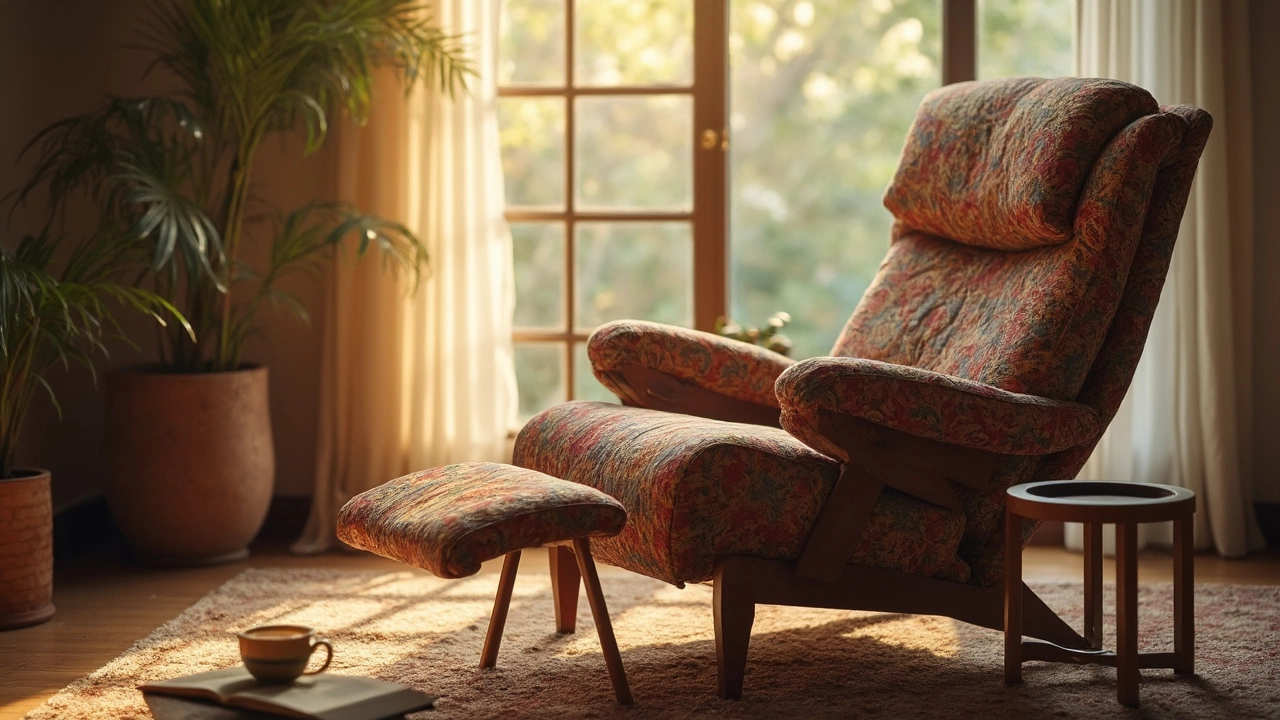So, you're wondering if cuddling up in your favorite recliner could be the reason for that nagging backache? Good question. Recliners sure are cozy, but are they meant for more than just a casual nap? Let's dig into whether sleeping in your trusty recliner could spell trouble for your back.
First off, why do so many people love these chairs? A lot of it has to do with how they ease pressure, especially on the lower back. When you lean back, it can lessen the stress on your spine by putting your body into a more relaxed position. But here's the kicker: staying in one position for too long, reclined or not, could mess with your back if your chair doesn't offer proper support. Ever felt stiff after a night's sleep in that cushy chair?
Next up, here's an interesting tidbit: some folks swear by recliners for relief from specific conditions like sleep apnea or acid reflux. The reason? Sleeping with your head elevated. It's easier to breathe and lessens reflux symptoms. Still, while that sounds awesome, is it all good news for back health? Well, it depends. Let's chat about the good, the bad, and the comfy of recliner lounging.
- The Recliner and Your Spine
- Key Benefits of Recliners
- Common Back Issues from Recliners
- Tips for a Back-Friendly Recliner Use
The Recliner and Your Spine
Ever thought about how your recliner chair affects your spine? Surprisingly, it might be both a friend and a foe, depending on how you use it. Let's break it down.
Spinal Alignment Matters
Proper spinal alignment is crucial for back health. When you're sitting or lying down, your spine should form a natural 'S' curve. Some recliners are designed to help maintain this posture by offering just the right support for your lower back and neck. However, if your chair lacks this support, it could mean trouble. An unsupported spine over time can lead to discomfort or even chronic pain. It's all about that balance.
Pressure Relief and Comfort
A key benefit of lounging in a recliner is pressure relief. Compared to sitting upright, reclining can take the load off the spine, which might explain why a lot of us feel comforted. This can be a big plus for folks with back issues already. But this is where you need to stay alert. Without a recliner that fits well, you might end up with more problems than you started with.
What the Studies Say
According to a few studies, sleeping in a reclined position can sometimes help reduce back pressure, particularly for those dealing with lumbar spine issues. Yet, it's not an across-the-board solution. Think about using a recliner for occasional naps rather than a full night's sleep.
Considering the Angles
| Recliner Angle | Impact on Spine |
|---|---|
| 90 degrees | Simple sitting, higher pressure on lower back |
| 110 degrees | Ideal angle, reduces spinal stress, excellent for relaxation |
| 150 degrees | Approaches a lying position, potentially beneficial for short naps |
Checking that your recliner allows for proper angling can make all the difference. Whether it's reading, watching TV, or catching some zzzs, your spine will thank you for finding the right angle.
In a nutshell, the recliner chair can be a great addition if it supports your spine properly. Keep a keen eye on your posture and use the chair wisely for the best results.
Key Benefits of Recliners
Recliners have a special place in many homes, and for good reason. They're not just about looking fancy; they actually offer a bunch of benefits, especially when it comes to comfort and health. Let's check out what makes a recliner chair more than just a neat addition to your living room.
Comfort to the Max
No surprise here: comfort reigns supreme. Recliners let you lean back and put your feet up, which feels really relaxing after a long day. It's like your chair's giving you a hug, especially if you pick one with cushy padding and a design that suits your body.
Back and Joint Support
One cool thing about recliners is how they support your back and joints. When you kick back in a recliner, it can help spread your body weight evenly, which eases pressure on your spine. This is a big deal if you're trying to avoid back problems. Some chairs even have special lumbar support or adjustable settings to match your comfort level.
Health Perks You Might Not Expect
Think recliners are just for relaxation? Nope! They can actually help with some health issues. People with sleep apnea or acid reflux might find recliners super handy. By sleeping slightly upright, breathing gets easier and acid stays where it should, reducing discomfort.
The Joy of Easy Adjustments
Recliners make adjusting your position a breeze. Many come with power buttons to change angles with zero effort. It’s awesome if mobility is a challenge or if you just love tweaking your seat while watching TV.
- Enhanced relaxation during TV time
- Improved circulation with feet elevated
- Less pressure on the heart when reclined
| Feature | Benefit |
|---|---|
| Power Recline | Adjusts position effortlessly |
| Lumbar Support | Extra back comfort |
| Heat and Massage | Relieves muscle tension |
So, it turns out there's more to a recliner chair than meets the eye. Whether you’re using it for a quick nap or nightly sleep, the right recliner can help keep pain at bay while offering a slew of perks. Just be sure it fits your body right for the ultimate comfy experience.

Common Back Issues from Recliners
So, if you're thinking that just because recliners are comfy, they must be perfect for your back, think again. While these chairs feel cozy, spending too much time on one without the right support can lead to some back issues.
A Lack of Lumbar Support
Many recliner chairs are designed with comfort in mind, but not all provide proper lumbar support. Without that, your lower back might suffer, leading to pain or tension. Picture sitting in a recliner where your lower back lacks support — it's like trying to hold up a book with no shelf. Over time, the constant strain can wear down your posture, causing discomfort.
Hunching and Slouching
Ever found yourself huddled into a recliner trying to find that sweet spot? Yeah, not the best for posture. Slouching or hunching can strain the spinal muscles and ligaments. Remember, prolonged sitting in a less-than-ideal position can potentially skew your spine alignment, leading to more back trouble down the line.
Restricted Movement
Though recliners allow you to relax, they might encourage you to stay put longer than necessary. Limited movement and sitting in one position can result in muscle stiffness. And stiff muscles often translate into back pain. We need to move to keep our muscles agile and joints fluid.
Recliner Stats
Not convinced yet? Here's some data to chew on:
| Common Back Issue | Percentage of Recliner Users Reporting It |
|---|---|
| Lumbar Pain | 45% |
| Muscle Stiffness | 38% |
| Postural Problems | 30% |
It's crucial to pick a chair that doesn't just look great in the living room — choosing one with adjustable lumbar support can make all the difference. Prioritizing a recliner chair that lets you adjust the back to a posture-friendly angle is a smart move.
Tips for a Back-Friendly Recliner Use
Alright, so you love your recliner chair but want to make sure you're not trading comfort for back problems. Here are some solid tips to enjoy that cozy seat without the unwanted aches.
Choose the Right Recliner
The first step is picking a recliner that matches your body. Look for chairs with adjustable lumbar support, especially if you're planning long chill sessions. You want the chair to curve with your spine, not fight against it.
Positioning Matters
When you doze off in a recliner, it's crucial to keep your body aligned. Instead of lying completely flat, aim for a slight recline to keep your back slightly supported. This puts less strain on your lower back.
- Feet on the ground: Make sure your feet are resting comfortably on the floor or on a footrest. Dangling legs can cause tension in the lower back.
- Support your neck: Use a small pillow or headrest if you notice your neck bending awkwardly. It helps reduce strain.
Mix It Up
Staying in any position for too long is a no-go for back problems. Shift positions every now and then, or get up and stretch. Give those muscles a little wake-up call.
Prioritize Quality
It's tempting to go for the first comfy looking chair, but investing in a quality recliner pays off. Look for chairs made from breathable material with sturdy construction. Spending a bit more upfront can save you from future discomfort and even medical bills.
Additional Perks
If you're buying a new chair, check for recliners with features like built-in massage, heating, or rocking. These extras can further help in maintaining relaxation and comfort, which is particularly helpful for anyone with existing back issues.
By keeping these tips in mind, you can enjoy your recliner's comfort without adding back problems to your list of worries. It all comes down to picking a supportive chair and being mindful about posture and duration.

